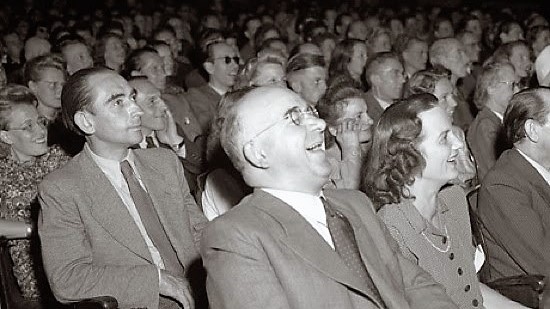To receive a free full-text email of The Zeitgeist whenever we publish to the website, please sign up here. You’ll get two or three of these emails every week, and your email will not be shared with anyone. Ever.


“To many, Beethoven’s most famous work is a symbol of exclusion and elitism in classical music.”
“How Beethoven’s 5th Symphony put the classism in classical music” (Vox)

TRUMP: There are a lot of people think that masks are not good.
STEPHANOPOULOS: Who are those people?
TRUMP: I’ll tell you who those people are … waiters. They come over and they serve you, and they have a mask. They’re playing with the mask, so the mask is over, and they’re touching it, and then they’re touching the plate. That can’t be good.
The concept of a mask is good, but it also does … you’re constantly touching it, you’re touching your face, you’re touching plates. There are people that don’t think masks are good.
“Trump’s ABC News town hall: Full transcript”
If you ever want a textbook example of what “begging the question” really means (because it doesn’t mean what you think it does), here you go:
We ask how Beethoven’s symphony was transformed from a symbol of triumph and freedom into a symbol of exclusion, elitism, and gatekeeping — everything we love to hate about classical music today. How did the meaning of this symphony get so twisted?
“How Beethoven’s 5th Symphony put the classism in classical music” (Vox)
“Begging the question” is the most commonly misused rhetorical phrase in the English-speaking world. It does NOT mean asking for an underlying question, and anytime I hear someone say, “Well that begs the question, why does blah blah blah?”, I die a little inside.
Begging the question is the assertion of a made-up premise that validates the “question” you then proceed to ask and answer.
So when Vox writes an insane article answering the question “How did the meaning of this symphony get so twisted?”, they first claim by assertion that, in fact, the meaning of Beethoven’s Fifth has been twisted. THAT is begging the question.
The go-to move by sophist demagogues like Vox and Trump to support a made-up premise is to claim that “many people” are asserting this made-up premise.
Why do they do this? Because it works.
Why does it work? Because Common Knowledge game. Because of the power of the crowd watching the crowd.
Claiming that “many people” believe that Beethoven’s Fifth is a symbol of exclusion is the verbal equivalent of a sitcom laugh track. In both cases, it’s the creation of an artificial audience for the real-life audience to observe, an artificial audience that cues the real-life audience to accept the made-up assertion. In the case of a sitcom, the made-up assertion might be that Joey and Chandler’s hijinks with Monica and Rachel are funny. In the case of modern politics, the made-up assertion might be that wearing masks is bad for you. The process to get you to laugh/believe is exactly the same.
Seriously, try to watch Friends without a laugh track (do a quick Google search, there are a lot of these, like here). What you thought was a funny show becomes … definitely NOT funny and more than a little frightening.
Now try to read a Trump tweet or a Vox article and substitute “I think” for “many people are saying”. What you thought was a somewhat-questionable-but-okay-I guess statement becomes … definitely NOT okay and more than a little frightening.
If there’s one thing you get from Epsilon Theory, it’s this: we human beings are biologically hard-wired to respond positively to a positively-responding crowd, and every high-functioning sociopath in Washington and Wall Street and Hollywood and Silicon Valley and every other concentration of political or economic power both knows our biological weakness and uses this biological weakness against us.
Once you start looking for these artificial audiences with their artificial cues, you will see them everywhere.
This is Fiat World, where the self-serving opinions and made-up assertions of the powerful are presented to us as fact, where “many people say” that we must vote for ridiculous candidates to be a good Republican or a good Democrat, where “many people say” that we must buy ridiculous securities to be a good investor, where “many people say” that we must borrow ridiculous sums to be a good parent or a good spouse or a good American.
How do we escape Fiat World? We can’t. Sorry.
How do we survive Fiat World? Clear Eyes to see their sophistry. Full Hearts to reject it.


I’m going to pose the argument that gets tossed at me every time I become a grammar or word definition scold: if, overtime, a new definition or usage becomes common, is it wrong anymore or isn’t that how languages evolve? To wit, doesn’t the new usage/definition become the de facto and, hence, correct one?
For example and drawing from one of my pet peeves, something either is or is not “unique” (one of a kind), it either is or isn’t; something can’t be “more” or “less unique.” But I’ve been told that “unique’s” definition is evolving to mean rare or special so something now can be “somewhat unique.” Blah.
Maybe, I guess. So Ben, what do you think of this applying to your view of what “begging the question means.” Hence, if enough people believe the “new” definition and use it that way; does that, in fact, become the phrase’s new meaning? I don’t love that argument, but think it might be the winning one. Thoughts?
Oh, and yes, our world is made up of these false arguments by highly functioning sociopaths (love that phrase Ben). Trump does it; Obama was a master of it. Obama would first frame an argument against his position in a way that would fail completely when he, then, followed up with his counter argument. Once you saw that he (like Trump with his version) did it all the time, it would drive you crazy.
One of the most pernicious places “many people” is manifested is Google. Most people searching for terms in their field of expertise have seen this, since SEO can be won with money. Just cements all kinds of bullshit into place.
Promise me, Ben, that you and Randy will never use a laugh track on ET Live!
This is similar to the idea of preference falsification - that people will say that they believe the group believes, not what they actually believe, in order to fit in with the group.
The subconscious impact of the crowd, even an artificial one, is scary. When the NBA came back, I really tried to like it, but I just couldn’t get into it. I have watched hundreds of hours of live basketball in gyms with little or no crowd, so I didn’t think it was about the crowd. But now that they are playing crowd noise and generic home team PA, I’m back in. We humans are much more easily manipulated than we like to think.
Rusty is willing to die on the hill of rejecting the Oxford comma. I’m willing to die on the hill of begging the question. I think we’re all willing to die on the hill of unique!
Absolutely right.
Promise!
Yep. It’s crazy how impactful even an artificial crowd can be.
I will not reject the possibility of dramatic background music or foleyed in sound effects, however.